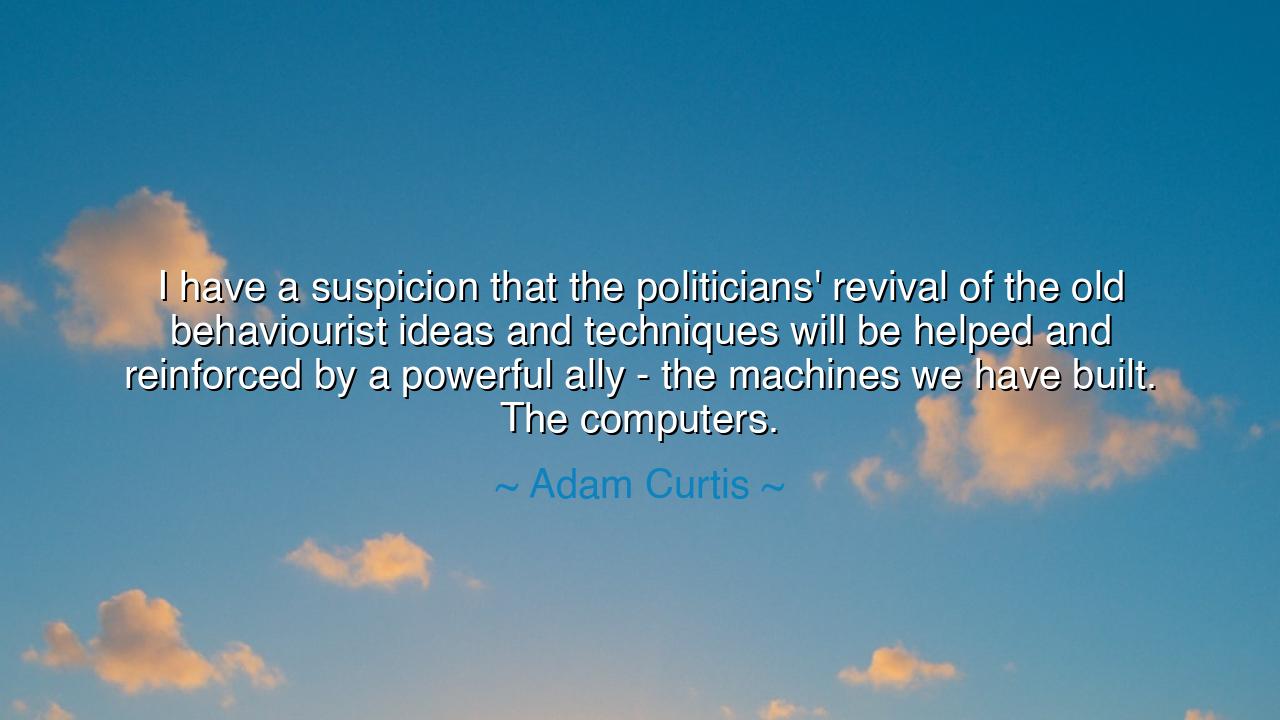
I have a suspicion that the politicians' revival of the old
I have a suspicion that the politicians' revival of the old behaviourist ideas and techniques will be helped and reinforced by a powerful ally - the machines we have built. The computers.






In the words of Adam Curtis, “I have a suspicion that the politicians' revival of the old behaviourist ideas and techniques will be helped and reinforced by a powerful ally—the machines we have built. The computers.” Curtis' words carry with them a chilling insight into the intersection of technology and politics, and the potential for these forces to shape human behavior on a scale never before imagined. The behaviorist approach, rooted in the belief that human actions can be shaped and controlled by external stimuli, is now being turbocharged by the machines—computers—that are increasingly integral to our lives. The tools we created to enhance human potential may, in the hands of those with the power to manipulate them, become instruments of control.
In the ancient world, the great minds such as Plato and Aristotle pondered the nature of free will and human nature. To them, the question was not simply about what shapes the actions of men, but about the virtue of their actions. Aristotle in his Nicomachean Ethics taught that the goal of life is to cultivate virtue, and with it, the capacity to make choices based on reason and wisdom. To him, the idea of human behavior being manipulated from the outside, whether by government or any other force, would have seemed not just dangerous but a perversion of the natural order—a violation of the individual's ability to act with moral autonomy.
Consider the example of Socrates, who famously questioned everything in the pursuit of wisdom. He believed in the capacity of the individual to reason and make choices independent of the societal norms or the political rulers of his time. His method was one of dialogue, encouraging individuals to think for themselves and to challenge external pressures. Socrates would have viewed the rise of behaviourist techniques in politics as a form of enslavement—a system that diminishes the individual's freedom to choose based on their own reason and values. Instead of promoting reason and self-discovery, such an approach would turn people into mere puppets, responding mechanically to stimuli.
This dynamic is all too clear in the modern world, where the growth of computational technology has made it possible to track and influence the behavior of vast populations. The rise of social media, algorithms, and s thoughts and behavior. They understood the power of controlling information and shaping the narrative to secure their rule. But in today’s world, the power of machine learning, big data, and artificial intelligence has raised this manipulation to an unprecedented scale. Curtis suggests that we now face a situation where the very machines we created to improve our lives might also enable new forms of coercion—not through violence, but through subtle and pervasive influence.
The lesson we must take from Curtis' warning is one of vigilance and wisdom. We must remember that technology, in and of itself, is not inherently good or bad. It is the intentions behind its use that define its impact. Just as Plato warned that unchecked power corrupts, we must remain cautious in how we use and allow others to use the tools of manipulation that technology places in our hands. We must safeguard the freedom to choose, the autonomy to think for ourselves, and the ability to act based on our own moral compass, rather than allowing external forces—whether they be governments, corporations, or algorithms—to shape our behavior in ways that limit our humanity.
In your own life, take this lesson to heart: the tools you use—whether they are computers, smartphones, or social media platforms—are not neutral. They are designed to influence, guide, and even shape your thoughts and choices. Be mindful of how you engage with them. Just as Socrates questioned everything, you must also question the forces at play in your life. Resist the temptation to accept blindly the narratives that are fed to you. Instead, seek to cultivate the inner strength to make decisions based on reason, wisdom, and virtue—the qualities that lead to true freedom. Only through this self-awareness can we ensure that the machines we create serve our best interests, rather than diminish our capacity for independent thought.






AAdministratorAdministrator
Welcome, honored guests. Please leave a comment, we will respond soon